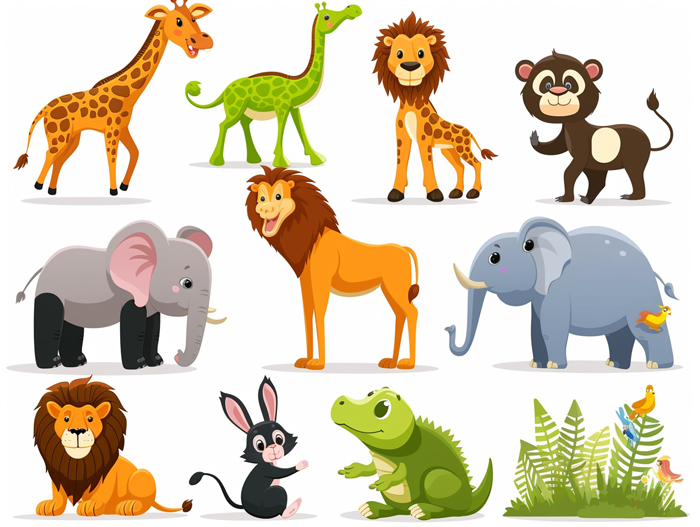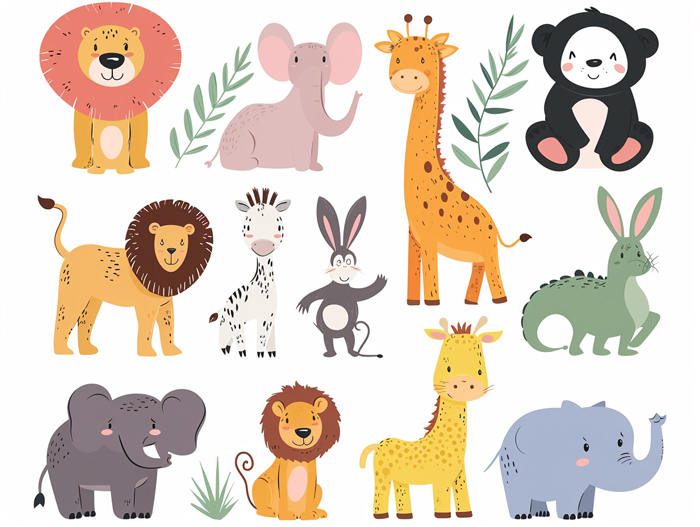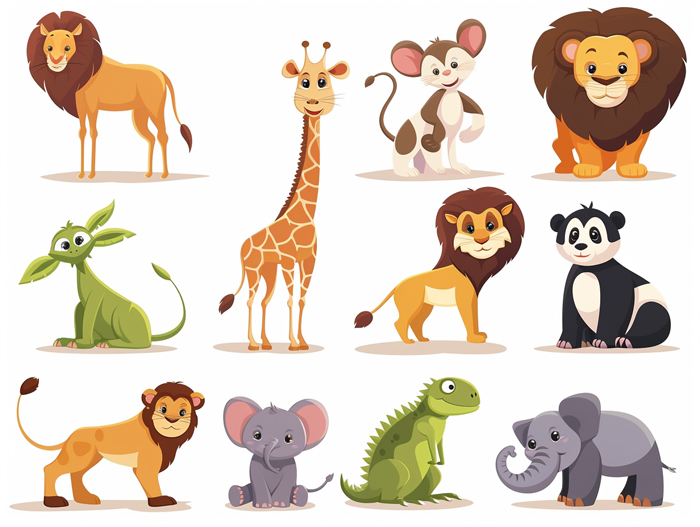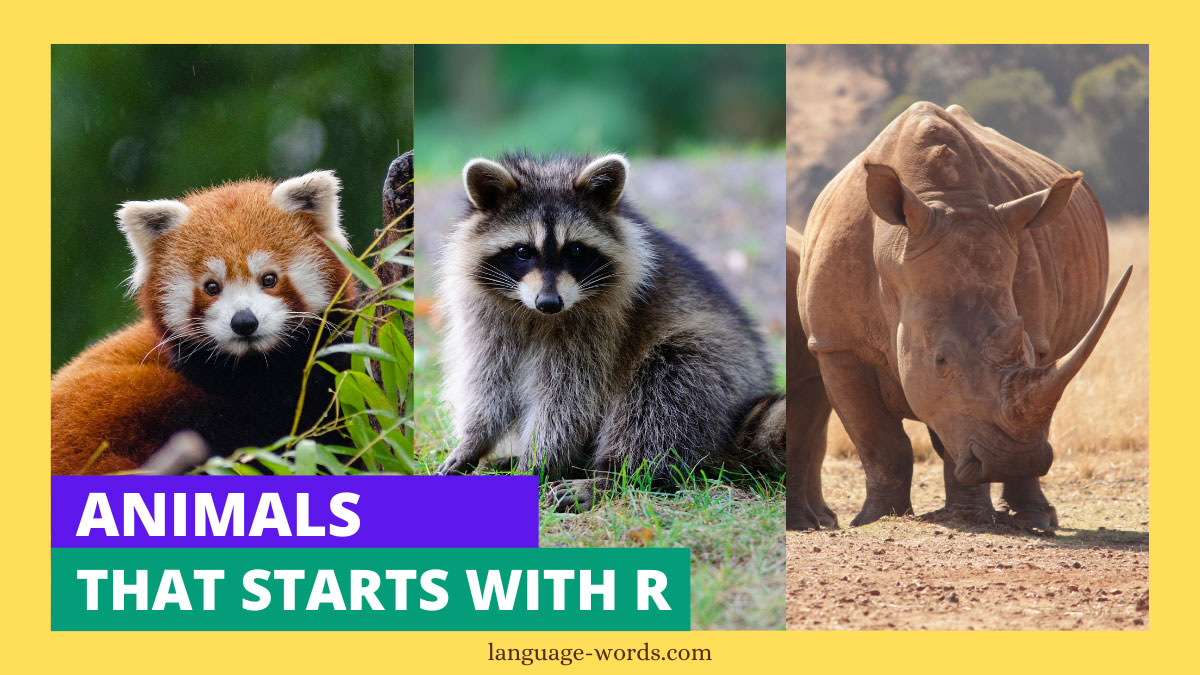Hey there animal lovers! Today, I’m going to take you on a wild ride through the animal kingdom, focusing on a specific group of creatures – those that start with the letter “R”. From majestic mammals to fascinating reptiles, the world of animals is full of surprises, and the letter “R” brings some truly remarkable species to the forefront. So, buckle up and get ready to explore the diverse and extraordinary world of animals that start with “R”!
In this article, I’ll introduce you to a range of fascinating creatures, each with their own unique characteristics and adaptations. We’ll delve into the rainforests, roam the savannahs, and even take a dip in the ocean to discover these incredible animals. From the king of the jungle, the regal lion, to the elusive and intelligent raccoon, we’ll uncover the secrets of these captivating creatures. So, whether you’re a nature enthusiast or simply curious about the animal kingdom, this article is sure to leave you amazed and eager to learn more about these incredible animals that start with “R”.
List Of Animals That Starts With R

| Rabbit | Raccoon | Raccoon Butterflyfish | Raccoon Dog |
| Racer Snake | Racoon | Racoon Dog |
Radiated Tortoise
|
| Ragamuffin | Ragdoll | Raggle | Rail |
| Rainbow Bee Eater | Rainbow Boa | Rainbow Fish |
Rainbow Grasshopper
|
| Rainbow Kribs | Rainbow Shark | Rainbow Snake | Rainbow Trout |
| Ram | Rambur’S Pied Shield Bug | Raspberry Crown Borer | Rat |
| Rat Snake | Rat Squirrel | Rat Terrier | Ratel |
| Ratfish | Rattlesnake | Raven | Ray |
| Razor Clam | Red Ackie Monitor | Red Admiral Butterfly | Red Angus |
| Red Aphids | Red Back Jumping Spider | Red Banded Leafhopper |
Red Bellied Black Snake
|
| Red Bellied Piranha | Red Bellied Woodpecker | Red Billed Quelea |
Red Billed Quelea Bird
|
| Red Breasted Merganser | Red Breasted Nuthatch | Red British Squirrel | Red Crossbill |
| Red Deer | Red Diamond Rattlesnake | Red Diamondback Rattlesnake | Red Drum |
| Red Drum Fish | Red Eared Slider | Red Eyed Tree Frog | Red Eyed Vireo |
| Red Faced Cormorant | Red Finch | Red Footed Booby |
Red Footed Tortoise
|
| Red Fox | Red Hake | Red Handed Tamarin |
Red Headed Ash Borer
|
| Red Headed Vulture | Red Headed Woodpecker | Red Kangaroo | Red King Crab |
| Red Kite | Red Knee Tarantula | Red Knot |
Red Legged Grasshopper
|
| Red Legged Seriema | Red Lionfish | Red Lipped Batfish |
Red Necked Grebe
|
| Red Nose Pit Bull | Red Octopus | Red Panda |
Red Paper Wasp
|
| Red Racer Snake | Red Rock Crab | Red Sea Urchin |
Red Shouldered Hawk
|
| Red Snapper | Red Spider Mite | Red Spitting Cobra |
Red Spotted Newt
|
| Red Squirrel | Red Star Chicken | Red Tail Boa | Red Tailed Boa |
| Red Tailed Bumblebee | Red Tailed Cuckoo Bumblebee | Red Tailed Hawk |
Red Throated Loon
|
| Red Throated Pipit | Red Velvet Mite | Red Vented Bulbul |
Red Whiskered Bulbul
|
| Red Winged Blackbird | Red Wolf | Redback Spider |
Red-Backed Shrike
|
| Redbone Coonhound | Redcap Chicken | Redfish |
Redhump Eartheater
|
| Redstart | Redtail Catfish | Red-Tailed Hawk | Redwing |
| Reef Shark | Reeves’S Muntjac | Regal Jumping Spider | Reindeer |
| Remora | Repenomamus | Reticulated Giraffe |
Reticulated Python
|
| Rex Rabbit | Rhamphosuchus | Rhea |
Rhesus Macaque
|
| Rhino | Rhino Beetle | Rhino Viper | Rhinoceros |
| Rhinoceros Beetle | Rhinoceros Iguana | Rhinoceros Viper |
Rhode Island Red Chicken
|
| Rhodesian Ridgeback | Rhombic Egg Eater Snake | Ribbon Eel | Ribbon Snake |
| Ribbonfish | Rice Stem Borer | Rice Weevil |
Ridge Tailed Monitor
|
| Right Whale | Rim Rock Crowned Snake | Ring Billed Gull |
Ring Necked Duck
|
| Ring Necked Pheasant | Ring Necked Snake | Ring Tailed Lemur |
Ringed Kingfisher
|
| Ringtail | Rinkhals Snake | Risso’S Dolphin | River Dolphin |
| River Otter | River Turtle | Roadrunner | Robber Flies |
| Robin | Roborovski Hamsters | Rock Bass | Rock Crab |
| Rock Hyrax | Rock Iguana | Rock Lobster | Rock Pigeon |
| Rock Ptarmigan | Rock Python | Rockfish |
Rockhopper Penguin
|
| Rocky Mountain Goat | Rocky Mountain Locust | Rodent | Roe Deer |
| Rooster | Roosterfish | Root Aphids |
Rose Breasted Grosbeak
|
| Rose Chafer | Rose Chafers | Rose Sawfly |
Roseate Spoonbill
|
| Ross’S Goose | Rosy Boa | Rosy Faced Lovebird |
Rosy Lipped Batfish
|
| Rosy Maple Moth | Rotterman | Rottle | Rottsky |
| Rottweiler | Rottweiler Mix | Rough Earth Snake |
Rough Green Snake
|
| Rough Legged Hawk | Rough Necked Monitor | Rough Toothed Dolphin |
Roughhead Blenny
|
| Roughneck Shrimp | Rough-Toothed Dolphin | Round Eared Elephant Shrew | Round Stingray |

| Round Tailed Horned Lizard | Rove Beetle | Royal Angelfish |
Royal Bengal Tiger
|
| Royal Penguin | Royal Python | Rubber Boa |
Ruby Crowned Kinglet
|
| Ruby Tailed Wasp | Ruby Throated Hummingbird | Rudd | Ruddy Duck |
| Ruddy Turnstone | Ruff | Ruffed Grouse |
Rufous Bellied Thrush
|
| Rufous Capped Warbler | Rufous Collared Sparrow | Rufous Hare Wallaby |
Rufous Hummingbird
|
| Rufous Mouse Lemur | Rufous Tailed Hummingbird | Rufous Tailed Jacamar | Russel’S Viper |
| Russell Terrier | Russian Bear | Russian Bear Dog | Russian Blue |
| Russian Desman | Russian Tortoise | Rusty Blackbird |
Rusty Capped Flycatcher
|
| Rusty Rumped Warbler | Rusty Sparrow | Rusty Spotted Cat |
Rusty Spotted Catshark
|
| Rusty Tussock Moth |
Raccoon: The Mischievous Bandit
Raccoons are fascinating creatures known for their distinctive markings and mischievous behavior. These intelligent mammals are found in various habitats across North and Central America. In this section, I will delve into their unique characteristics and adaptations that make them such successful survivors in the animal kingdom.
1. Adaptability: Raccoons are highly adaptable creatures, allowing them to thrive in a wide range of environments. From forests and woodlands to urban areas, these resourceful animals have successfully adapted to live alongside humans. Their ability to find food in diverse settings is one of the reasons they have earned a reputation as “bandits.”
2. Nocturnal Hunters: Raccoons are primarily nocturnal, meaning they are most active during the night. Their keen sense of hearing, sharp claws, and dexterous paws make them excellent hunters of small animals such as frogs, fish, and rodents. They are also opportunistic omnivores, feeding on fruits, nuts, insects, and even human garbage.
3. Adaptations for Survival: Raccoons have several physical adaptations that contribute to their survival. Their front paws are similar to human hands, allowing them to manipulate objects and open containers with ease. Their sharp canine teeth help them catch and hold prey, while their distinctive facial mask aids in camouflage and may help reduce glare from their eyes.
4. Problem Solvers: Raccoons are known for their problem-solving skills. They can remember solutions to tasks for up to three years, showcasing their impressive cognitive abilities. This makes them adept at overcoming obstacles in search of food and shelter.
5. Social Behaviors: Raccoons are not solitary animals. They often live in small family groups called “nurseries” or “gazes.” These groups typically consist of a female and her offspring. During the winter months, raccoons may den together to conserve body heat. Social interactions within these groups play an important role in mating and raising young raccoons.
Raccoons are truly remarkable animals with their adaptability, intelligence, and unique characteristics. Despite their reputation as mischievous bandits, they have managed to carve out a niche in various habitats and coexist alongside humans.

Red Panda: The Cute and Curious Climber
Red pandas are fascinating creatures that capture the hearts of many with their adorable appearance and unique behaviors. These small mammals are native to the forests of the Himalayas and southwestern China. In this section, I’ll take a closer look at the red panda’s physical characteristics, their preferred habitat, diet, and their interesting climbing abilities.
One glance at a red panda is enough to make anyone go “aww” – they are known for their distinctive reddish-brown fur, masked face, and bushy tail. But their cuteness is not their only remarkable feature. Their physical adaptations also play a crucial role in their survival in their mountainous habitats.
Red pandas have a dense coat of fur that keeps them warm in the cold mountain climate. Their long, bushy tail serves multiple purposes – it helps them maintain balance while climbing trees, provides insulation from the cold, and can even be used as a blanket to cover their face during sleep. They also have a modified wrist bone that acts as a “thumb,” allowing them to grasp and manipulate objects with precision. This adaptation is particularly handy when it comes to feeding.
Speaking of feeding, red pandas are primarily herbivorous, with their diet consisting mainly of bamboo. In fact, bamboo makes up about 95% of their diet. These curious creatures have a specialized pseudo-thumb that helps them grip bamboo shoots while they voraciously munch through the leaves. However, they are not strictly herbivorous and occasionally supplement their diet with fruits, berries, and even the occasional bird egg.
One of the most fascinating aspects of the red panda’s behavior is its climbing ability. These agile climbers spend a significant amount of their time in trees, where they forage for food and seek shelter. Their sharp, semi-retractable claws and flexibility allow them to navigate the tree branches with ease, often moving in a slow and deliberate manner. It’s truly a remarkable sight to witness a red panda gracefully leaping from one tree to another.
Red pandas are more than just cute and cuddly creatures. They are well-adapted to their mountainous habitats, with their unique physical characteristics enabling them to thrive. From their reddish-brown fur to their bushy tails and climbing abilities, these curious climbers continue to captivate and fascinate animal lovers around the world.
Rhinoceros: Giants of the Grasslands
Rhinoceros, also known as rhinos, are fascinating creatures that roam the grasslands of the world. As an expert on animals, I have always been captivated by these majestic giants. In this section, I will share some interesting facts about rhinoceros that will make you appreciate their unique characteristics even more.
Physical Appearance:
Rhinoceros are known for their massive size and tough exteriors. They are the second largest land mammal, surpassed only by the elephant. With their thick, armored skin and large horns, they have a truly intimidating presence. Rhinos come in different species, including the white rhinoceros, black rhinoceros, Indian rhinoceros, and Sumatran rhinoceros. Each species has its own distinct physical features.
Habitat and Range:
Rhinoceros can be found in various parts of the world, from the grasslands of Africa to the dense forests of Asia. They have adapted to different environments and can thrive in both open plains and dense vegetation. Despite their large size, rhinos are surprisingly agile and can navigate through challenging terrain with ease.
Diet and Feeding Habits:
Unlike their carnivorous counterparts, rhinoceros are herbivores. They mainly feed on grass, leaves, shoots, and fruits. Their strong and blunt lips help them graze efficiently on their preferred vegetation. Rhinos have a slow metabolism, requiring them to consume large quantities of food to meet their energy needs.
Conservation Status:
Sadly, rhinoceros face numerous challenges in the wild. They are hunted for their horns, which are highly valued in some cultures for their supposed medicinal properties. This illegal trade has led to a drastic decline in their population. Additionally, habitat loss due to human encroachment further threatens their survival. Several conservation efforts are underway to protect and preserve these magnificent creatures.
Fun Fact:
Did you know that rhinoceros have poor eyesight but possess an acute sense of smell? They use their sense of smell to navigate their surroundings and communicate with other rhinos.
Rhinoceros are awe-inspiring creatures that deserve our admiration and protection. Their physical appearance, habitat range, and feeding habits make them unique among the animal kingdom. It is essential that we continue to support conservation efforts to ensure the survival of these giants of the grasslands
Rattlesnake: The Eerie Venomous Serpent
The rattlesnake is a fascinating creature that belongs to the venomous family of snakes. With its distinctive rattle at the end of its tail, it’s no wonder why the rattlesnake has captivated the imagination of people around the world. In this section, I’ll delve into the physical characteristics, habitat, behavior, and conservation status of this eerie serpent.
Physical Appearance:
The rattlesnake is known for its unique appearance. It has a triangular-shaped head, which is a common trait among venomous snakes. Its body is covered in scales, often in earthy tones like brown or green, helping it blend seamlessly into its surroundings. The most iconic feature of the rattlesnake is, of course, its rattles, which are made up of interlocking segments that produce a distinctive sound when shaken.
Habitat and Range:
Rattlesnakes can be found in various habitats across the Americas, from deserts and grasslands to forests and swamps. They are highly adaptable and can survive in diverse climates, including the arid regions of Arizona and the humid jungles of Central America. However, they are most commonly associated with dry, rocky areas where they can seek shelter in crevices or burrows.
Behavior and Feeding Habits:
Rattlesnakes are mostly solitary creatures, preferring to hunt and live alone. They are skilled predators, using their heat-sensing pits to detect warm-blooded prey, such as rodents and small mammals. Once they have captured their prey, rattlesnakes inject venom through their fangs, immobilizing it and allowing for easier consumption. It’s important to note that rattlesnakes do not prey on humans unless provoked or cornered.
Conservation Status:
Unfortunately, many species of rattlesnakes are facing threats to their survival. Habitat destruction, illegal collection for the pet trade, and persecution by humans have all contributed to their declining populations. With the loss of their natural habitats, rattlesnakes face increased encounters with humans, leading to conflicts and ultimately harm to both snakes and people. Conservation efforts are crucial to protect these unique and ecologically important snakes.
The rattlesnake is a remarkable creature with its eerie appearance, venomous capabilities, and adaptability to various habitats. Understanding their behavior and the conservation challenges they face is essential for their survival.

Rottweiler: The Powerful and Loyal Canine
When it comes to animals starting with the letter “R,” one cannot overlook the remarkable Rottweiler. Known for their strength and loyalty, Rottweilers are a popular breed of dog that have gained immense popularity over the years. In this section, let’s explore the key characteristics that make Rottweilers such remarkable canines.
Physical Appearance: Rottweilers are large and robust dogs with a distinctive appearance. They have a muscular build, broad chest, and a well-defined, powerful jaw. Their coat is short and dense, usually black with signature rust-colored markings on the face, chest, and legs. With their striking appearance, Rottweilers often emanate a sense of confidence and strength.
Temperament and Behavior: Despite their strong and imposing appearance, Rottweilers are known for their calm and confident demeanor. They are extremely loyal and protective of their family, making them excellent guard dogs. Rottweilers are also highly intelligent and can be easily trained with consistent and positive reinforcement methods. Proper socialization from an early age helps them develop a friendly and confident personality.
Exercise and Training: Rottweilers are an active breed and require regular physical exercise to keep them healthy and happy. They thrive in environments that provide ample opportunities for play, walks, and mental stimulation. Engaging in activities such as obedience training, agility, and tracking exercises can help stimulate their intelligent minds and strengthen the bond between the dog and their owner.
Health and Care: Like any other breed, Rottweilers are prone to certain health conditions. This includes hip and elbow dysplasia, heart conditions, and certain types of cancers. Regular veterinary check-ups, a balanced diet, and exercise are crucial to maintaining their overall health. Proper grooming, including regular brushing and occasional baths, helps keep their coat clean and healthy.
Rottweilers are truly remarkable animals starting with the letter “R.” Their power, loyalty, and intelligence make them incredible canine companions. However, it is important to remember that responsible ownership, proper training, and socialization play key roles in raising a well-behaved and happy Rottweiler.
So, if you’re considering adding a Rottweiler to your family, remember to invest time and effort into their well-being and provide them with the love and care they deserve. With the right training and care, a Rottweiler can
Conclusion
In this article, I’ve delved into the fascinating world of animals that start with the letter “R,” focusing specifically on the Rottweiler. We’ve explored various aspects of this breed, including their physical appearance, temperament, exercise and training needs, as well as their overall health and care.
Rottweilers are known for their incredible strength and unwavering loyalty. They possess a high level of intelligence, making them quick learners and adaptable companions. However, it’s important to note that their intelligence also requires mental stimulation and regular exercise to keep them happy and well-balanced.
Responsible ownership is crucial when it comes to raising a Rottweiler. Proper training and socialization are key to ensuring they develop into well-behaved and happy dogs. Additionally, maintaining their health through regular veterinary check-ups, a nutritious diet, and adequate exercise is essential.
By understanding the unique characteristics and needs of Rottweilers, we can provide them with the love, care, and attention they deserve. These incredible animals have so much to offer, and with the right guidance, they can become cherished members of our families.

